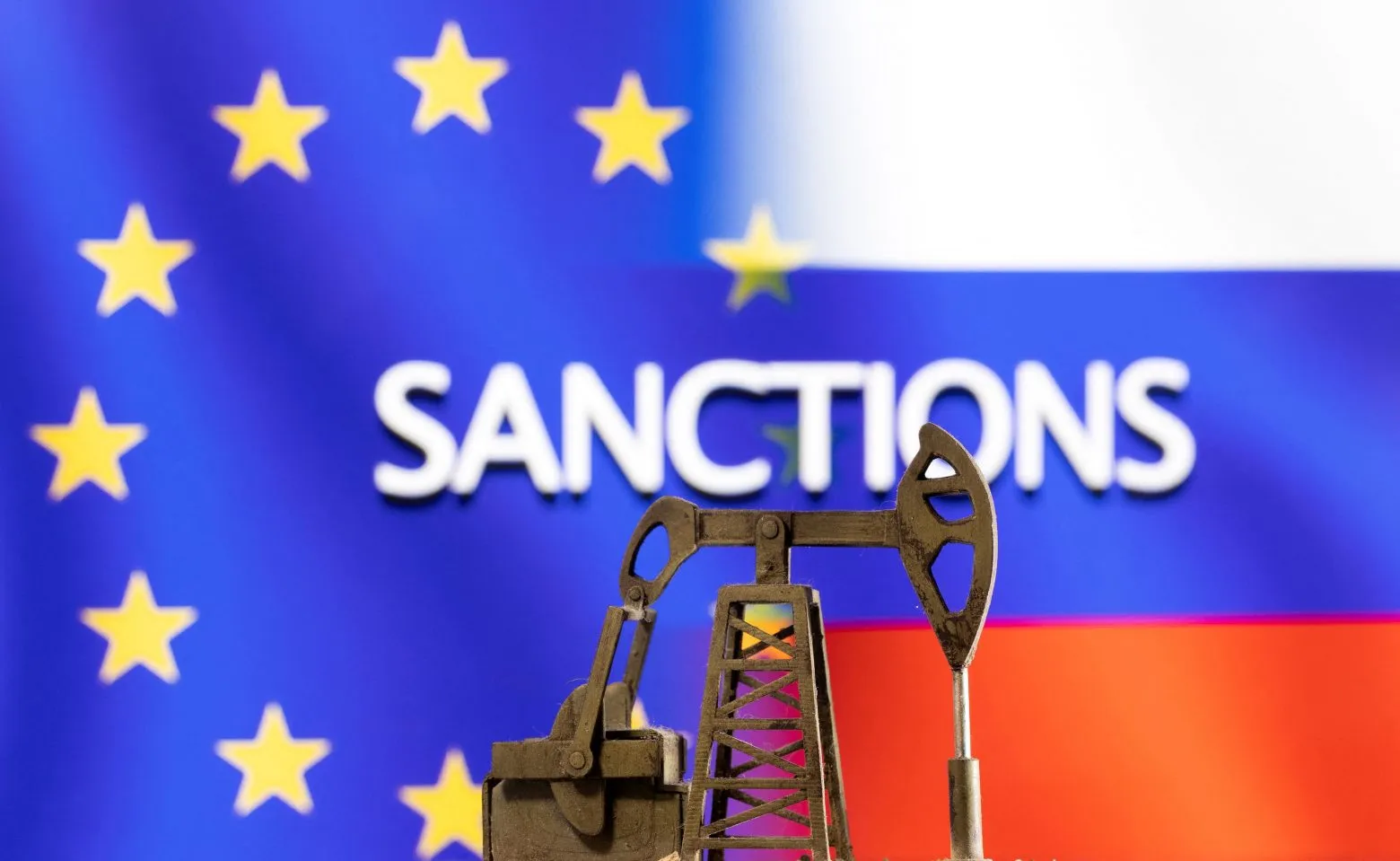A new wave of European Union sanctions targeting Russian crude oil, slated to take full effect on January 21 next year, is casting a long shadow over India’s thriving fuel export industry. While initially offering a temporary reprieve, the latest EU package introduces a stringent definition of “Russian-origin fuels” that could significantly complicate operations for major Indian refiners, most notably Reliance Industries. The core challenge lies in the requirement for importers to provide explicit evidence of the crude oil’s country of origin, a complex task for a nation that has become one of the top two importers of discounted Russian oil.
The move underscores the EU’s escalating efforts to choke off Russia’s war funding, but its broad sweep risks creating unintended economic ripple effects, particularly for countries like India that have strategically leveraged cheaper Russian crude to fuel their domestic needs and maintain robust export markets. As the deadline approaches, Indian fuel exporters are bracing for operational hurdles, potential market shifts, and a re-evaluation of their supply chain strategies.
The EU’s Evolving Sanctions Regime: A Deeper Dive into Intent
The European Union’s imposition of sanctions on Russia is a direct response to the ongoing conflict in Ukraine, aimed at weakening Moscow’s economic capacity to finance its military aggression. Since the full-scale invasion in February 2022, the EU, in coordination with G7 partners, has progressively rolled out a series of punitive measures, targeting key sectors of the Russian economy, including its lucrative energy industry.
Initially, sanctions focused on direct imports of Russian crude oil and petroleum products into the EU. However, as global energy markets adapted and new trade routes emerged, particularly with countries like India and China stepping up their purchases of discounted Russian crude, the EU recognized the need for more sophisticated mechanisms to prevent circumvention. The latest package of sanctions, announced on Friday, July 18, 2025, represents this evolution, moving beyond direct import bans to target refined products derived from Russian oil, even if processed in a third country.
The critical element of this new regulation, published in legal text over the weekend, is the explicit demand for “evidence of the country of origin of the crude oil used for the refining of the product in a third country.” This clause is designed to close a perceived loophole where Russian crude, once refined in a non-sanctioning country, could effectively shed its “Russian” identity and re-enter European markets as a product of the refining nation.
A particularly contentious aspect for nations like India is the “net exporter” clause. The legal text states: “Petroleum products imported from third countries which were net exporters of crude oil in the previous calendar year shall be considered to have been obtained from domestic crude oil and not from crude oil originating in Russia, unless a competent authority has reasonable grounds to believe that they have been obtained from Russian crude oil.” This seemingly benign clause has significant implications for India. As a net importer of crude oil, India does not qualify for this exemption. This means that Indian refiners will face the burden of proof, regardless of the overall balance of their crude imports, if they wish to export refined products to the EU. This effectively puts a spotlight on India’s sourcing of Russian oil, making its refined fuel exports to Europe susceptible to the ban.
The EU’s intent is clear: to ensure that the spirit of the sanctions is upheld and that Russian oil revenues are curtailed, even if they pass through intermediate refining hubs. This policy reflects a broader geopolitical strategy to exert maximum economic pressure on Russia, acknowledging that energy exports remain a primary source of its state budget.
India’s Energy Tapestry: A Global Refining Powerhouse
India stands as the world’s third-largest energy consumer and a significant player in the global refining landscape. Its vast and growing economy necessitates substantial energy imports, primarily crude oil, to meet the demands of its industrial sector, transportation, and burgeoning population. Historically, India has diversified its crude oil imports, sourcing from the Middle East, Africa, and North America.
The Surge in Russian Oil Imports
The geopolitical landscape shifted dramatically in early 2022 following the conflict in Ukraine. Western sanctions on Russian oil led to a significant discount on Urals crude, Russia’s flagship export blend. India, always keen on securing affordable energy for its energy-hungry economy, seized this opportunity. From being a marginal buyer of Russian oil, India rapidly ascended to become one of Russia’s largest crude oil customers, often vying with China for the top spot.
This surge was driven by purely economic considerations: Russian oil offered a substantial discount compared to traditional suppliers, providing a crucial cost advantage for Indian refiners. This allowed them to either pass on savings to domestic consumers or enhance their profit margins on refined product exports. The volume of Russian oil imported by India increased exponentially, transforming global crude trade flows and creating a new energy axis.
India’s Strategic Refining Capacity
Beyond its role as an importer, India possesses a sophisticated and expansive refining capacity. The country has invested heavily in modern refineries, making it a “refining hub” capable of processing various crude grades into a wide range of refined products, including diesel, gasoline, jet fuel, and naphtha. This strategic capacity allows India not only to meet its domestic fuel demand but also to be a significant exporter of refined petroleum products to markets across Asia, Africa, and crucially, Europe.
Companies like Reliance Industries, with its massive Jamnagar refinery complex, are at the forefront of this refining prowess. Reliance’s refineries are among the largest and most complex in the world, equipped to handle diverse crude feedstock and produce high-value refined products. Europe has traditionally been a key market for Indian refined fuels, given its proximity and demand for specific products. This symbiotic relationship, built on India’s refining capabilities and Europe’s energy needs, is now directly threatened by the new EU sanctions.
The Looming Impact on Indian Fuel Exporters
The EU’s new rules, particularly the “evidence of origin” requirement and the “net importer” exclusion, present a multi-faceted challenge for Indian fuel exporters.
Operational Complexities and Supply Chain Scrutiny
The most immediate impact will be on the operational front. Refiners typically blend various crude oils to optimize their processes and product yields. Tracing the exact origin of every molecule of crude within a refined product, especially in a large, integrated refinery, is an immense logistical and administrative undertaking.
- Proof of Origin: The European Commission’s upcoming guidance on the “kind of evidence importers must provide” will be crucial. This could range from certificates of origin for each crude batch, detailed refinery input-output records, independent audits, or even blockchain-based tracking systems. Implementing such rigorous verification processes will require significant investment in new systems, personnel, and compliance frameworks.
- Segregation Challenges: To avoid the ban, refiners might be forced to segregate Russian and non-Russian crude streams, or dedicate specific refinery units to processing only non-Russian crude destined for Europe. This could lead to inefficiencies, reduced flexibility, and higher operational costs.
- Documentation Burden: Every shipment to Europe will require meticulous documentation proving the non-Russian origin of the crude feedstock. Any discrepancies or insufficient evidence could lead to delays, seizures, or penalties, disrupting trade flows and increasing compliance risks.
Market Access and Competitive Landscape
The primary concern for Indian exporters is the potential loss of market share in Europe. If proving origin becomes too burdensome or if the EU’s interpretation of the rules is overly strict, Indian refined products could effectively be shut out of a significant and lucrative market.
- Diversification of Export Markets: Indian refiners will likely accelerate efforts to find alternative markets for their refined products. This could mean increasing exports to other Asian countries, Africa, or Latin America. However, these markets may not offer the same price premiums or demand profiles as Europe, potentially impacting profitability.
- Increased Competition: The redirection of Indian refined products could intensify competition in non-European markets, potentially leading to lower prices and thinner margins globally. Conversely, refiners in countries with domestic crude supply (e.g., the US, Saudi Arabia) or those less reliant on Russian oil might see an opportunity to increase their market share in Europe.
- Impact on Throughput: If new markets cannot fully absorb the volumes previously destined for Europe, Indian refiners might be forced to reduce their refinery utilization rates, impacting their overall profitability and contribution to the Indian economy.
Financial Repercussions: The Reliance Industries Case Study
The immediate market reaction to the news highlighted investor concerns. Shares of Reliance Industries closed 3.3% lower at ₹1,428.20 on Monday, even as the benchmark BSE Sensex ended 0.5% higher. This decline, despite Reliance reporting a robust 78% year-on-year jump in quarterly profit to ₹26,994 crore on Friday, underscores the market’s sensitivity to potential future headwinds. While the company’s recent earnings were strong, reflecting healthy refining margins and robust domestic demand, the EU sanctions introduce a significant element of uncertainty regarding its future export revenues.
For Reliance, a company with extensive global operations and a history of adapting to market shifts, the challenge will be to navigate this new regulatory environment without significantly impacting its export volumes or profitability. The financial implications could include:
- Reduced Export Revenues: A direct consequence if European market access is curtailed.
- Higher Operational Costs: Due to increased compliance, segregation, and potential re-routing of supplies.
- Investment Re-evaluation: Future investment decisions in refining capacity or crude sourcing might be influenced by the need to comply with evolving international sanctions.
Navigating the Labyrinth: Strategies and Diplomacy
Both the Indian government and its energy companies will need to adopt multi-pronged strategies to navigate this complex regulatory landscape.
Awaiting European Commission Guidance
The European Commission’s upcoming guidance on evidence requirements is eagerly anticipated. This guidance will define the practical parameters for compliance. Indian refiners and the government will be closely scrutinizing this document to understand the exact mechanisms for proving crude origin. It is hoped that the guidance will be pragmatic and workable, avoiding overly bureaucratic or technologically unfeasible demands. Dialogue between Indian and EU authorities will be crucial in shaping these guidelines.
Indian Government’s Diplomatic and Policy Response
The Indian government has consistently maintained that its purchases of Russian oil are driven by national energy security needs and that it is not violating any international sanctions. However, the new EU rules directly impact Indian commercial interests.
- Diplomatic Engagement: India will likely engage in robust diplomatic discussions with the EU to express its concerns, seek clarifications, and potentially negotiate for more flexible or phased implementation rules. The goal would be to ensure that legitimate trade is not unduly hampered.
- Policy Adjustments: The government might consider policy incentives or frameworks to encourage refiners to diversify their crude sources further or to prioritize domestic consumption of Russian-origin fuels while reserving non-Russian crude for export to Europe.
- Support for Refiners: Providing technical or financial assistance to refiners to implement the necessary compliance infrastructure could also be a consideration.
Industry Adaptation Strategies
Indian refiners, renowned for their agility and resilience, will be implementing various strategies:
- Diversification of Crude Sources: While Russian oil offers a cost advantage, refiners may gradually increase imports from alternative suppliers in the Middle East, Africa, and the Americas to reduce their exposure to sanction-related risks. This would involve re-negotiating long-term supply contracts and optimizing logistics.
- Diversification of Export Markets: Intensifying efforts to expand market share in non-European regions will be critical. This includes strengthening relationships with buyers in Southeast Asia, Africa, and Latin America, and exploring new markets where demand for refined products is growing.
- Technological Solutions: Investing in advanced supply chain management software, crude oil tracking systems, and possibly even blockchain solutions to provide irrefutable evidence of crude origin. This could enhance transparency and compliance.
- Advocacy and Collaboration: Indian industry bodies, such as the Federation of Indian Petroleum Industry (FIPI), will likely engage with their European counterparts and lobby the EU for a more nuanced approach to the sanctions, emphasizing the global nature of crude blending and refining.
Broader Geopolitical and Economic Implications
The EU’s latest sanctions package has implications that stretch beyond India’s immediate commercial interests, touching upon global energy security and geopolitical alignments.
Effectiveness of EU Sanctions
This move by the EU is a clear signal of its determination to tighten the screws on Russia’s energy revenues. By targeting refined products, the EU aims to reduce the overall global demand for Russian crude, even if it’s processed elsewhere. The effectiveness of these sanctions will depend on the degree to which they genuinely disrupt Russian oil flows and reduce Moscow’s ability to finance its war efforts. However, it also highlights the complex challenge of implementing sanctions in an interconnected global economy without causing significant collateral damage.
India-EU Trade Relations
While the immediate focus is on energy, the sanctions could introduce a point of friction in the broader India-EU trade relationship. Both sides have been pursuing closer economic ties, including discussions on a free trade agreement. Navigating this energy-related challenge amicably will be important for maintaining the positive momentum in their bilateral relations. India’s stance has always been one of strategic autonomy, prioritizing its national interests, particularly energy security.
Global Energy Market Dynamics
The new rules could lead to further re-routing of global oil and refined product flows. If Indian exports to Europe are curtailed, it could mean more Russian crude stays in Asia, potentially pushing down prices in that region, while Europe might need to source refined products from other regions, potentially at higher costs. This could lead to increased volatility and uncertainty in global energy markets. The global energy transition, with its increasing demand for critical minerals and refined products for green technologies, adds another layer of complexity to these market dynamics.
Impact on Russia
While the sanctions aim to hurt Russia, the extent of the impact will depend on Russia’s ability to find alternative buyers for its crude and refined products. The global demand for energy remains high, and countries not participating in the sanctions regime may continue to purchase Russian supplies, albeit potentially at deeper discounts. The long-term effectiveness hinges on whether these measures truly reduce Russia’s overall energy revenue significantly.
Conclusion: A Test of Resilience and Diplomacy
The EU’s impending ban on fuels refined from Russian crude presents a significant test for Indian fuel exporters, particularly Reliance Industries. The requirement to prove crude origin introduces unprecedented operational and compliance challenges, threatening to disrupt established trade routes and impact profitability. This move underscores the intricate web of geopolitics and global energy markets, where sanctions designed to pressure one nation can create complex ripple effects across the world.
For India, a nation committed to both its energy security and its role as a global refining hub, navigating this new regulatory landscape will require a blend of strategic adaptation, technological innovation, and astute diplomacy. While the immediate future may hold headwinds, the resilience of Indian refiners and the government’s commitment to protecting national economic interests will be crucial in determining how effectively the country can re-calibrate its energy trade and maintain its position in the evolving global energy order. The coming months, as the European Commission issues its detailed guidance and as Indian companies adjust their strategies, will be critical in shaping the contours of this new reality.
Ready to take your career to the next level? Join our dynamic courses: ACCA, HESI A2, ATI TEAS 7 , HESI EXIT , NCLEX – RN and NCLEX – PN, Financial Literacy!🌟 Dive into a world of opportunities and empower yourself for success. Explore more at Serrari Ed and start your exciting journey today! ✨
Photo sourcr: Google
By: Montel Kamau
Serrari Financial Analyst
22nd July, 2025
Article, Financial and News Disclaimer
The Value of a Financial Advisor
While this article offers valuable insights, it is essential to recognize that personal finance can be highly complex and unique to each individual. A financial advisor provides professional expertise and personalized guidance to help you make well-informed decisions tailored to your specific circumstances and goals.
Beyond offering knowledge, a financial advisor serves as a trusted partner to help you stay disciplined, avoid common pitfalls, and remain focused on your long-term objectives. Their perspective and experience can complement your own efforts, enhancing your financial well-being and ensuring a more confident approach to managing your finances.
Disclaimer: This article is for informational purposes only and does not constitute financial advice. Readers are encouraged to consult a licensed financial advisor to obtain guidance specific to their financial situation.
Article and News Disclaimer
The information provided on www.serrarigroup.com is for general informational purposes only. While we strive to keep the information up to date and accurate, we make no representations or warranties of any kind, express or implied, about the completeness, accuracy, reliability, suitability, or availability with respect to the website or the information, products, services, or related graphics contained on the website for any purpose. Any reliance you place on such information is therefore strictly at your own risk.
www.serrarigroup.com is not responsible for any errors or omissions, or for the results obtained from the use of this information. All information on the website is provided on an as-is basis, with no guarantee of completeness, accuracy, timeliness, or of the results obtained from the use of this information, and without warranty of any kind, express or implied, including but not limited to warranties of performance, merchantability, and fitness for a particular purpose.
In no event will www.serrarigroup.com be liable to you or anyone else for any decision made or action taken in reliance on the information provided on the website or for any consequential, special, or similar damages, even if advised of the possibility of such damages.
The articles, news, and information presented on www.serrarigroup.com reflect the opinions of the respective authors and contributors and do not necessarily represent the views of the website or its management. Any views or opinions expressed are solely those of the individual authors and do not represent the website's views or opinions as a whole.
The content on www.serrarigroup.com may include links to external websites, which are provided for convenience and informational purposes only. We have no control over the nature, content, and availability of those sites. The inclusion of any links does not necessarily imply a recommendation or endorsement of the views expressed within them.
Every effort is made to keep the website up and running smoothly. However, www.serrarigroup.com takes no responsibility for, and will not be liable for, the website being temporarily unavailable due to technical issues beyond our control.
Please note that laws, regulations, and information can change rapidly, and we advise you to conduct further research and seek professional advice when necessary.
By using www.serrarigroup.com, you agree to this disclaimer and its terms. If you do not agree with this disclaimer, please do not use the website.
www.serrarigroup.com, reserves the right to update, modify, or remove any part of this disclaimer without prior notice. It is your responsibility to review this disclaimer periodically for changes.
Serrari Group 2025
















